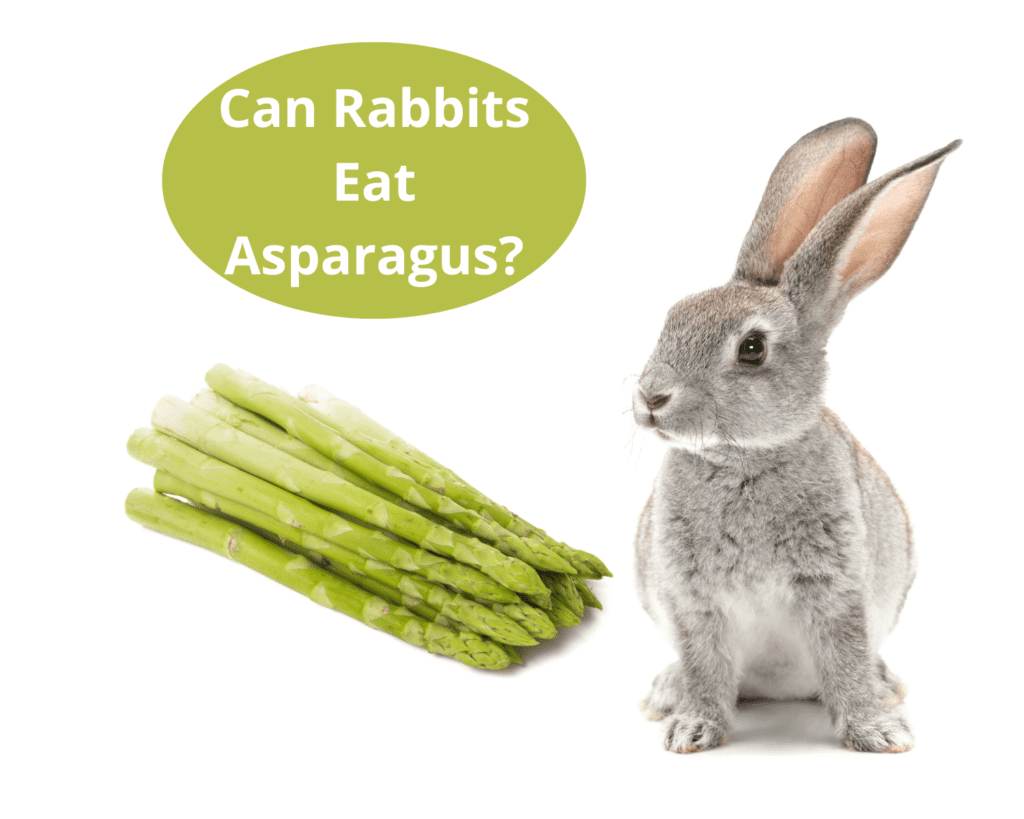Asparagus, also known as sparrow grass, makes for a great, healthy side dish for humans. But is this spring vegetable suitable for the delicate stomachs of rabbits?
Can rabbits eat asparagus? Read on to find out!
Can Rabbits Eat Asparagus?
Yes, rabbits can eat asparagus as a part of their daily vegetable dietary allowance, as long as their consumption is moderate.
As it is a stem vegetable, asparagus should be fed to rabbits less than leafy green vegetables and only offered as an occasional treat.
Nutritional Information Of Asparagus
A two-inch spear tip of raw asparagus, which is the usual safe amount to give to your rabbit, has the following nutritional information:
- Energy: 0.7 kcal
- Water: 3.26 g
- Carbohydrates: 0.136 g
- Protein: 0.077 g
- Fiber: 0.074 g
- Sugars: 0.066 g
- Potassium: 7.07 mg
- Phosphorus: 1.82 mg
- Calcium: 0.84 mg
- Magnesium: 0.49 mg
- Vitamin C: 0.196 mg
- Iron: 0.075 mg
- Sodium: 0.07 mg
- Vitamin E: 0.04 mg
- Zinc: 0.019 mg
- Lutein + zeaxanthin 24.8 µg
- Beta carotene: 15.7 µg
- Folate: 1.82 µg
- Vitamin K: 1.46 µg
- Vitamin A: 1.33 µg
- Choline: 0.56 µg
This serving weighs about 3.5 grams and all data is according to the US Department of Agriculture’s FoodData Central. Other unlisted nutrients are small enough to be negligible in this serving size.
If you choose to give your rabbit more asparagus – for example, one whole spear – then be aware of the different nutritional amounts.
A small spear of asparagus weighs about 12 grams, while a large one weighs about 20 grams. Do note that cooking asparagus will decrease its nutritional value.
3 Potential Hazards To Watch For When Feeding Asparagus
1. Diarrhea
Due to the high water content of asparagus, a rabbit may experience softened stools that lead to diarrhea. Diarrhea is very dangerous for rabbits and can require medical attention.
2. Gastrointestinal Stasis
Excessive asparagus consumption can lead to gut flora disruption that forms a blockage in a rabbit’s digestive system. This is why rabbits can’t eat too many stem-type vegetables.
3. Uneaten Caecotrophs
Overly soft stools from high water content in asparagus can lead to this problem.
However, sufficient hay consumption will typically prevent this from happening unless you are allowing your rabbit to eat excessive amounts of asparagus.
4 Benefits To Feeding Your Rabbit Asparagus
1. It’s Hydrating
Asparagus is 93% water, so it’s extra hydrating for a rabbit. It’s a great choice for warm climates or as a different way to get more water into your rabbit’s diet.
2. It’s Low In Calories
Asparagus is unlikely to make your rabbit overweight, as it’s very low in calories and can be eaten without worrying about causing unwanted weight gain.
3. It’s Got Lots Of Vitamins
Asparagus has tons of vitamins, ranging from vitamin C to K. These vitamins serve many purposes, providing boosts to health and immunity while ensuring the healthy bodily function of your rabbit.
4. It Has A Low Calcium Content
Rabbits absorb calcium very easily, which makes them at risk for various forms of toxicity related to excessive calcium consumption.
The low calcium content of asparagus makes it suitable for rabbits to eat without you worrying about these issues.
Best Ways To Feed Asparagus To A Rabbit
The best way to feed asparagus to a rabbit is to take one stem of the vegetable and slice off a two-inch portion, then cut that portion into bite-sized pieces.
The portion should not be of the hard white part of the stem but can be of the soft tip or the middle green stem. This should be fed to a rabbit alongside a variety of other vegetables, within the required amount of 1 to 2 cups per 6 lbs of a rabbit’s body weight.
It’s okay to feed your rabbits cooked asparagus, but there’s ultimately no point in doing this. It may make the vegetables easier to digest, but it’ll also remove a lot of the important nutrients in the vegetable.
On top of that, most rabbits prefer the crunch of raw asparagus. Just make sure you wash the veggie first!
The white ends of asparagus and the roots of asparagus should not be fed to a rabbit. They may cause stomach upset and have less nutritional value, so there’s no point in using them as a treat.
There are a few different colors of asparagus, and they all have the same sort of nutritional content.
As such, the one you feed to your rabbit will depend on their preference and taste. Most rabbit owners opt for simple green asparagus.
How Much Asparagus Can A Rabbit Safely Have?
On a technical level, large adult rabbits can safely consume a few stems of asparagus before their daily vegetable allowance is used up.
However, it is ultimately not a good idea to fill up that vegetable allowance with only asparagus or any stem vegetable.
Rabbits need variety, leafy greens, and more vegetables in their diet, and there are many that are better for them. In other words, while it is technically “safe”, it’s not advisable or the healthiest choice to feed several stems of asparagus to your rabbit.
One single two-inch cutting, whether of the tip or stem of asparagus, is sufficient for a full-grown adult rabbit and should be fed once to thrice a week at most. Young rabbits below 7 months of age should not be fed any asparagus.
As with all new foods, you should introduce asparagus into your rabbit’s diet slowly. Feed it only a small amount first, then wait 48 hours to see if your rabbit has an adverse reaction to it.
If all is well, gradually increase the amount fed until you’re confident that your rabbit can eat asparagus safely.
Conclusion
Rabbits often enjoy the crunchy nature of fresh, raw asparagus. In moderation, asparagus can provide a good amount of vitamins and hydration to your rabbit without the risk of calcium toxicity or weight gain.
Just make sure that you’re only feeding them a little bit, as this is more of a treat food to be mixed with other vegetables than a regular dietary component!

